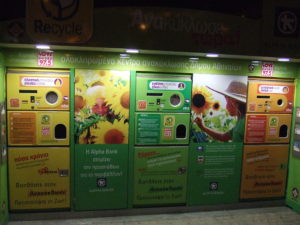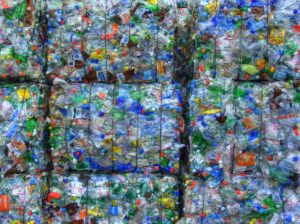Every year, the United States recycles a great celebration—America Recycles Day! Since 1997, the country has celebrated America Recycles Day to educate citizens about the benefits of recycling and how to recycle.
America Recycles Day is an outgrowth of a similar day created by Texas in 1994. Kevin Tuerff and Valerie Davis, working for the Texas Commission on Environmental Quality, chose November 15 as Texas Recycles Day because it was about six months after Earth Day and lodged between the news-stealing periods around elections and the annual Thanksgiving and Christmas holidays. They passed the idea along to the National Recycling Coalition, which organized the first national event in 1997, featuring Vice President Al Gore as the Honorary Chair. Eventually, the program moved to Keep America Beautiful, one of 16 initiates of that organization.
Each year, the U.S. president proclaims America Recycles Day. In 2017, President Trump included these comments in his statement:
Today, on the 20th anniversary of America Recycles Day, we celebrate Americans whose recycling habits help maintain our global leadership and competitiveness. The rate of recycling in the United States has grown from less than 7 percent in 1960 to more than 34 percent in 2014. Still, materials worth $9 billion are thrown away each year. Rather than throwing away valuable resources, we should return them back into our economy, to rebuild our Nation’s infrastructure and create innovative new products…. In 2007, recycling and reuse activities accounted for 757,000 American jobs and produced $36.6 billion in wages. By reusing and recycling, individuals and communities across our country can do their part to keep our lands beautiful, while also growing American jobs and strengthening our economy.

Although the proclamation is national, the day’s events are largely grass roots. In 2017, 1.5 million people participated in about 2000 registered local events, and 73,800 individuals signed the annual pledge to recycle.
Americans take recycling seriously. Since 1960, the rate at which we recycle municipal waste has increased 18-fold. According to the EPA, in 2015 the country recycled 68 million tons and composted 23 million tons of municipal solid waste that otherwise would have gone to landfills. That amounts to about 34% of all municipal solid waste generated, so we still have more progress to make.
For example, many countries recycle a much higher proportion of their waste than the U.S. Germany leads the world, recycling 56%, with Austria, South Korea and Wales also above half. The U.S. actually ranks 25th among countries in waste recycling, coming in behind most of Western Europe, Australia, Singapore and Hong Kong.

A global group, the Bureau of International Recycling (BIR), has taken to calling recycled materials the “seventh resource.” They claim that the world’s six major natural resources are water, air, oil, natural gas, coal and minerals (needless to say, anyone interested in “renewable” natural resources would object to leaving out soil, plants, animals and all forms of biodiversity, but let’s not worry about that now). Naming recycled materials as the seventh resource reinforces the idea that we can conserve other resources as substitutes for extracting new resources from the earth, destroying wild lands and consuming energy. According to BIR, the seventh resource provides 40% of the world’s raw material needs today—and could supply much more.
So, on America Recycles day—and every other day of the year—make sure you do your part to enlarge our seventh resource (or whatever number it is!).
References:
Bureau of International Recycling. Recycling: The Seventh Resource Manifesto. Available at: https://www.globalrecyclingday.com/wp-content/uploads/2017/12/ManifestoFINAL.pdf. Accessed October 26, 2018.
Environmental Protection Agency. National Overview: Facts and Figures on Materials, Wastes and Recycling. Available at: https://www.epa.gov/facts-and-figures-about-materials-waste-and-recycling/national-overview-facts-and-figures-materials#Recycling/Composting. Accessed October 26, 2018.
Gray, Alex. 2017. Germany recycles more than any other country. World Economic Forum, 18 Dec 2017. Available at: https://www.weforum.org/agenda/2017/12/germany-recycles-more-than-any-other-country/. Accessed October 26, 2018.
Heyn, Beth. 2017. America Recycles Day 2017: 5 Fast Facts You Need to Know. Heavy, Nov. 15, 2017. Available at: https://heavy.com/news/2017/11/america-recycles-day-2017-facts-ideas-participate/. Accessed October 26, 2018.
Keep America Beautiful. America Recycles Day. Available at: https://americarecyclesday.org/. Accessed October 26, 2018.
Watson, Rob. 2017. The 20th Anniversary and History of America Recycles Day. SWEEP, November 16, 2017. Available at: https://nrra.net/sweep/the-20th-anniversary-and-history-of-america-recycles-day/. Accessed October 26, 2018.
White House. 2017. America Recycles Day. The White House, November 15, 2017. Available at: https://www.whitehouse.gov/briefings-statements/america-recycles-day/. Accessed October 26, 2018.
